“You may think it strange that a Turk and a soldier like myself who has been bred to war should talk this way. But this is precisely the idea that is behind the new Turkey. We want no force, no conquest. We want to be let alone and permitted to work out our own economic and political destiny. Upon this is reared the whole structure of the new Turkish democracy, which, let me add, represents the American idea, with this difference—we are one big state while you are forty-eight.
“My idea of nationalism is that of a people of kindred birth, religion and temperament. For hundreds of years the Turkish Empire was a conglomerate human mass in which Turks formed the minority. We had other so-called minorities, and they have been the source of most of our troubles. That, and the old idea of conquest. One reason why Turkey fell into decay was that she was exhausted by this very business of difficult rulership. The old empire was much too big and it laid itself open to trouble at every turn.
“But that old idea of force, conquest, and expansion is dead in Turkey forever. Our old empire was Ottoman. It meant force. It is now banished from the vocabulary. We are now Turks—only Turks. This is why we want a Turkey of the Turks, based on that ideal of self-determination which was so well expressed by Woodrow Wilson. It means nationalism, but not the kind of selfish nationalism that has frustrated self-determination in so many parts of Europe. Nor does it mean arbitrary tariff walls and frontiers. It does signify the open door to trade, economic regeneration, a real territorial patriotism as embodied in a homeland. After all these years of blood and conquest the Turks have at last attained a fatherland. Its frontiers have been defined, the troublesome minorities are dispersed, and it is behind these frontiers that we propose to make our stand and work out our own salvation. We propose to be masters in our own house.”
Kemal’s Constructive Program
Again he leaned toward me and said in his sharp staccato fashion:
“Do you know what has obstructed European peace and reconstruction? Simply this—the interference of one nation with another. It is part of the selfish grasping nationalism to which I have already referred. It has led to the substitution of politics for economics. The German reparations tangle is only one example. The curse of the world is petty politics.
“There are nations who would block our hard-won Turkish independence; who decry our nationalism and say it is merely a camouflage to hide the desire for conquest of our neighbors on the east, and who maintain that we are not capable of economic administration. Well, they shall see.
“The first and foremost idea of the new Turkey is not political but economic. We want to be part of the world of production as well as of consumption.”
“What specific aid can the United States render this new Turkey of yours?” I asked.
“Many things,” came from the blond giant at my left. “Turkey is essentially a pastoral land. We must stand or fall by our agriculture. In the program for regeneration three main activities stand out. They are agriculture, transportation, and hygiene, for the death rate in our villages is appallingly large.
“First take agriculture. We must develop a whole new science of farming, first through the establishment of agricultural schools, in which America can help; second through the introduction of tractors and other modern farm machinery. We must develop new crops, such as cotton, and expand our old ones, such as tobacco. The motor, whether on the highway or the farm, will be our first aid.
“Transportation is equally vital. Before the World War the Germans had laid out a comprehensive scheme of transportation for Turkey, but it was based upon economic absorption of the country by them. Happily we are rid of the Germans, and so far as I am concerned, they will never get back to authority. We look to America to develop our much-needed railroads. This is one reason why we gave them the Chester Concession. I hope that the Americans realize what this concession means to us. It is not only the hope of adequate transport, but the building of new ports and the exploitation of our national resources, principally oil.
“In the matter of hygiene we have already installed a ministry of sanitation as part of the cabinet and every effort will be made to prevent the infant mortality. Here America can again help.
“While I am on the matter of economics let me deal with another question of vital importance to the new Turkey. The tragedy of Turkey in the past was the selfish attitude of the great European powers towards one another in respect of her commercial development. It was the inevitable result of the great game of concession grabbing. The powers were like dogs in a manger. If they failed in their desires they made it their business to keep rivals out as well. It is precisely what has been going on in China for years, but they will make no China out of Turkey. We will insist upon the open door for everybody, as it was enunciated by John Hay, and equality of opportunity for all. If the European powers do not like this procedure they can keep out.”
“What is your panacea for the present world malady?” I next asked.
“Intelligent cooperation and not unintelligent suspicion and distrust,” was the swift retort.
“Is the League of Nations the remedy?” I continued.
“Yes and no,” came from Kemal. “The League’s error lies in that it sets up certain nations to rule, and other nations to be ruled. The Wilsonian idea of self-determination seems to be strangely lost.”
When I asked Kemal if he was in favor of allying Turkey with the League of Nations he answered: “Conditionally, but the League as at present operated remains an experiment.”
On two significant subjects Kemal has views of peculiar interest. They are Germany and Bolshevism.
A Subtle Game
I am betraying no confidence when I say that long before the Great War, which proved so costly to his. country largely because of German conspiracy, he persistently opposed the German intrigue at Constantinople. It was his violent objection to everything German that caused Enver Pasha, who with Talaat Pasha divided the mastery of government during the war, to seek to break him in the army service and get him out of the way.
Instead of ending Kemal’s career, Enver provided him with the means of redeeming Turkey and making himself the national hero. Kemal’s antagonism to the Germans today is no less pronounced.
With the Bolshevists Kemal played a subtle and winning game. In the early days of the Nationalist movement he had urgent need of arms and munitions. He angled with Moscow until he got what he wanted in the shape of supplies, and then gave them the cold shoulder. At that time the Bolshevists looked upon the new Turks as heaven-born allies for the red conquest of the whole Near East. They were the first to recognize the Angora Government, and still maintain an elaborate mission there.
Kemal and his chief colleagues are convinced that Bolshevism has passed the peak and is on the down grade. If the ” Bolos” think that they have a willing tool in Kemal they have another guess coming.
Upon one subject of universal interest, the emancipation of Turkish women, Kemal has definite opinions. He not only favors the ultimate banishment of the veil but wants woman to be part and parcel of the public life. His views run in this wise:
“Our women ought to be the equal of men in education and activity. From the earliest times of Islam there have been women savants, authors and orators, as well as women who opened schools and delivered lectures. The Moslem religion even orders women to educate themselves to the same standard as men. In the war with the Greeks, Turkish women replaced the absent men in all kinds of work at home, and even undertook the transport of munitions and supplies for the army. It was done in response to a true sociological principle— namely, that women should collaborate with men in making society better and stronger.
“It is supposed that in Turkey women pass their lives in inactivity and in idleness. That is a calumny. In the whole of Turkey, except in large towns, the women work side by side with the men in the fields, and participate in the national work generally. It is only in large towns that Turkish women are sequestered by their husbands. This arises from the fact that our women veil and cloister themselves more than their religion orders. Tradition has gone too far in this respect.”
During the whole interview, save for the two occasions when he leaned forward to emphasize his points, Kemal had sat erect in his chair, smoking cigarettes continually. The only time there was the slightest indication of a break in those stony features was when we started to discuss more or less personal affairs at the end of the talk, and when I told him that I had not married because ‘I traveled so much and that no wife would stand such incessant action. He thereupon said: “I have only lately married myself.”
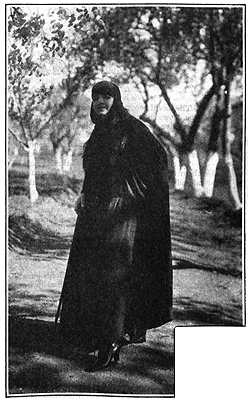
Madame Kemal
This naturally leads to the romance in Kemal’s life. Like other men of iron he has his one vulnerable point, and having met Madame Kemal I can understand why he succumbed. I heard the whole story at first hand and in this fashion: While we were in the midst of the interview the butler entered and whispered something in Kemal’s ear. Instantly he turned and said, not without pride, “Madame Kemal is coming down.”
Become a Saturday Evening Post member and enjoy unlimited access. Subscribe now
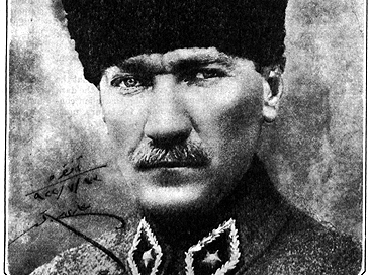
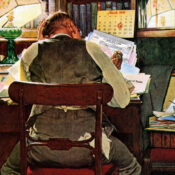
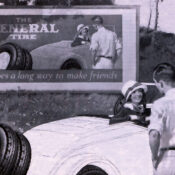
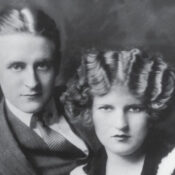
Comments
Very clever and very peaceful . Great leader.
History without bias is probably best perceived through articles written at its time for events and personalities which (who) are to be evaluated after passing the test of time, but are tarnished by opponents contemporaneously on purpose because they still continue to effect the present by their lasting resonances. Having learnt him very well to easily admire such a high caliber leader encompassing all universal values at large,I believe Kemal Pasha (our Ataturk) will contine to shine ever more, to become eventually a star above most founding fathers for all humanity.
It was great to read from a amazing journalist who got face to face with the great leader I admire.
Thank you Saturday Evening Post for publishing this article, and giving us another opportunity to learn Ataturk from his own words.
ATATÜRK YÜZYILIN LİDERİDİR. ÖNGÜRELERİ BİR BİR ÇIKIYOR. AYRICA BU RÖPORTAJI GERÇEKLEDİĞİNİZ İÇİN GAZETENİZE ŞÜKRANLARIMI İLETİYORUM…
I really appreciate your help, also publishing online this article is great! Hope many people can reach it easily and read, and understand one more time we had best leader in Turkish history and we need to keep all that improvement in hour life and history.
Thank you one more time for publishing this great article, and many many great years to the Post…
The greatest leader on earth. Thanks for everything Ataturk.
I would like to convey my gratitude to The Post. I have to express my appreciation that among other qualifications, The Saturday Evening Post has the vast experience and capability to enlighten the history.After 89 years posting this interview on your website is great service to acquaint the people on history.
I wish many successful 300 years to Saturday Evenin Post.